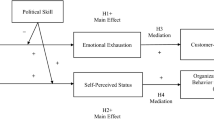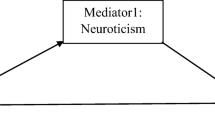Abstract
We explore the impact of victims’ narcissism on their emotional responses to workplace victimization, specifically, anger and hope. In Study 1 (N = 271; health and social services organization employees), instrumented regression analysis revealed the associations between perceived workplace victimization and victims’ hope and anger to be negative and positive, respectively, among grandiose narcissists. Neither emotion mediated the victimization-performance association using time-separated measurement from supervisors (subsample N = 148). In Study 2 (N = 369; adults who have experienced workplace victimization), grandiose narcissism was associated positively with other-focused hope in an incident recall exercise yet not with anger, and associated negatively with two coping behaviors. Vulnerable narcissism was associated positively with both hope and anger, as well as a variety of coping behaviors. In a randomized scenario experiment (subsample N = 171), grandiose narcissism was associated negatively with hope and positively with anger only when independent self-construal was primed, whereas vulnerable narcissism was associated more strongly with both emotions when interdependent self-construal was primed. Across both studies, we conclude chronic activation of independent self-construal may ‘insulate’ grandiose narcissists from the socio-contextual cues needed to generate emotional responses that would facilitate effective coping in the face of workplace victimization. Further, though both variants of narcissism demonstrated maladaptive coping in the face of a severe social threat, vulnerable narcissists may possess a stronger potential for adaptive coping than grandiose narcissists, owing to their elevated feelings of hope.
Similar content being viewed by others

Data availability
Anonymized data can be made available to reviewers by request, and will be accessible publicly through Mendeley Data if published.
Notes
Victimization regressed with statistical significance (p < 0.05) on the instrument, political skill, in both the anger and hope model in both full and subsample analyses, as expected.
References
Ames, D. R., Rose, P., & Anderson, C. P. (2006). The NPI-16 as a short measure of narcissism. Journal of Research in Personality, 40(4), 440–450. https://doi.org/10.1016/j.jrp.2005.03.002
Andersson, L. M., & Pearson, C. M. (1999). Tit for tat? The spiraling effect of incivility in the workplace. Academy of Management Review, 24(3), 452–471. https://doi.org/10.5465/amr.1999.2202131
Antonakis, J., Bendahan, S., Jacquart, P., & Lalive, R. (2010). On making causal claims: A review and recommendations. The Leadership Quarterly, 21(6), 1086–1120. https://doi.org/10.1016/j.leaqua.2010.10.010
Aquino, K., Grover, S. L., Bradfield, M., & Allen, D. G. (1999). The effects of negative affectivity, hierarchical status, and self-determination on workplace victimization. Academy of Management Journal, 42(3), 260–272. https://doi.org/10.5465/256918
Bentley, J. R., Treadway, D. C., Williams, L. V., Gazdag, B. A., & Yang, J. (2017). The moderating effect of employee political skill on the link between perceptions of a victimizing work environment and job performance. Frontiers in Psychology, 8, A850. https://doi.org/10.3389/fpsyg.2017.00850
Bergkvist, L., & Rossiter, J. R. (2007). The predictive validity of multiple-item versus single-item measures of the same constructs. Journal of Marketing Research, 44(2), 175–184. https://doi.org/10.1509/jmkr.44.2.175
Chang, E. C., & DeSimone, S. L. (2001). The influence of hope on appraisals, coping, and dysphoria: A test of hope theory. Journal of Social and Clinical Psychology, 20(2), 117–129. https://doi.org/10.1521/jscp.20.2.117.22262
Coleman, S. R., Pincus, A. L., & Smyth, J. M. (2019). Narcissism and stress-reactivity: A biobehavioural health perspective. Health Psychology Review, 13(1), 35–72. https://doi.org/10.1080/17437199.2018.1547118
Ferris, G. R., Treadway, D. C., Kolodinsky, R. W., Hochwarter, W. A., Kacmar, C. J., Douglas, C., & Frink, D. D. (2005). Development and validation of the political skill inventory. Journal of Management, 31(1), 126–152. https://doi.org/10.1177/0149206304271386
Ferris, G. R., Blickle, G., Schneider, P. B., Kramer, J., Zettler, I., Solga, J., Noethen, D., & Meurs, J. A. (2008). Political skill construct and criterion-related validation: A two-study investigation. Journal of Managerial Psychology, 23(7), 744–771. https://doi.org/10.1108/02683940810896321
Folkman, S. (2010). Stress, coping, and hope. Psycho-Oncology, 19(9), 901–908. https://doi.org/10.1002/pon.1836
Folkman, S., & Lazarus, R. S. (1985). If it changes it must be a process: Study of emotion and coping during three stages of a college examination. Journal of Personality and Social Psychology, 48(1), 150–170. https://doi.org/10.1037/0022-3514.48.1.150
Forgays, D. G., Forgays, D. K., & Spielberger, C. D. (1997). Factor structure of the state-trait anger expression inventory. Journal of Personality Assessment, 69(3), 497–507. https://doi.org/10.1207/s15327752jpa6903_5
Gentile, B., Miller, J. D., Hoffman, B. J., Reidy, D. E., Zeichner, A., & Campbell, W. K. (2013). A test of two brief measures of grandiose narcissism: The narcissistic personality inventory–13 and the narcissistic personality Inventory-16. Psychological Assessment, 25(4), 1120–1136. https://doi.org/10.1037/e571452013-063
Glasø, L., Nielsen, M. B., & Einarsen, S. (2009). Interpersonal problems among perpetrators and targets of workplace bullying. Journal of Applied Social Psychology, 39(6), 1316–1333. https://doi.org/10.1111/j.1559-1816.2009.00483.x
Hart, W., Adams, J. M., & Tortoriello, G. (2017). Narcissistic responses to provocation: An examination of the rage and threatened-egotism accounts. Personality and Individual Differences, 106, 152–156. https://doi.org/10.1016/j.paid.2016.10.049
Hart, W., Tortoriello, G. K., Richardson, K., & Breeden, C. J. (2020). Substantive vs. superficial self-enhancement: Differentiating narcissism constructs from self-esteem following failure. Personality and Individual Differences, 152, 109560. https://doi.org/10.1016/j.paid.2019.109560
Hendin, H. M., & Cheek, J. M. (1997). Assessing hypersensitive narcissism: A reexamination of Murray's narcism scale. Journal of Research in Personality, 31(4), 588–599. https://doi.org/10.1006/jrpe.1997.2204
Izard, C. E. (1977). Human emotions. Plenum Press. https://doi.org/10.1007/978-1-4899-2209-0
Jauk, E., Breyer, D., Kanske, P., & Wakabayashi, A. (2021). Narcissism in independent and interdependent cultures. Personality and Individual Differences, 177, 110716. https://doi.org/10.1016/j.paid.2021.110716
Konrath, S., Bushman, B. J., & Grove, T. (2009). Seeing my world in a million little pieces: Narcissism, self-construal, and cognitive–perceptual style. Journal of Personality, 77(4), 1197–1228. https://doi.org/10.1111/j.1467-6494.2009.00579.x
Krizan, Z., & Herlache, A. D. (2018). The narcissism spectrum model: A synthetic view of narcissistic personality. Personality and Social Psychology Review, 22(1), 3–31. https://doi.org/10.1177/1088868316685018
Krizan, Z., & Johar, O. (2015). Narcissistic rage revisited. Journal of Personality and Social Psychology, 108(5), 784–801. https://doi.org/10.1037/pspp0000013
Lazarus, R. S. (1991a). Emotion and adaptation. Oxford University Press.
Lazarus, R. S. (1991b). Progress on a cognitive-motivational-relational theory of emotion. American Psychologist, 46(8), 819–834. https://doi.org/10.1037/0003-066X.46.8.819
Lazarus, R. S. (1999). Hope: An emotion and a vital coping resource against despair. Social Research, 66(2), 653–678.
Lebel, R. D. (2017). Moving beyond fight and flight: A contingent model of how the emotional regulation of anger and fear sparks proactivity. Academy of Management Review, 42(2), 190–206. https://doi.org/10.5465/amr.2014.0368
Lewis, S. E., & Orford, J. (2005). Women's experiences of workplace bullying: Changes in social relationships. Journal of Community & Applied Social Psychology, 15(1), 29–47. https://doi.org/10.1002/casp.807
Linton, D. K., & Power, J. L. (2013). The personality traits of workplace bullies are often shared by their victims: Is there a dark side to victims? Personality and Individual Differences, 54(6), 738–743. https://doi.org/10.1016/j.paid.2012.11.026
Liu, P., Xiao, C., He, J., Wang, X., & Li, A. (2020). Experienced workplace incivility, anger, guilt, and family satisfaction: The double-edged effect of narcissism. Personality and Individual Differences, 154, 109642. https://doi.org/10.1016/j.paid.2019.109642
Lutgen-Sandvik, P. (2008). Intensive remedial identity work: Responses to workplace bullying trauma and stigmatization. Organization, 15(1), 97–119. https://doi.org/10.1177/1350508407084487
Marden, M. O., & Rice, M. J. (1995). The use of hope as a coping mechanism in abused women. Journal of Holistic Nursing, 13(1), 70–82. https://doi.org/10.1177/089801019501300108
Markus, H. R., & Kitayama, S. (1991). Culture and the self: Implications for cognition, emotion, and motivation. Psychological Review, 98(2), 224–253. https://doi.org/10.1037/0033-295x.98.2.224
Matthiesen, S. B., & Einarsen, S. (2007). Perpetrators and targets of bullying at work: Role stress and individual differences. Violence and Victims, 22(6), 735–753. https://doi.org/10.1891/088667007782793174
Mikkelsen, E. G., Hansen, Å. M., Persson, R., Byrgesen, M. F., & Hogh, A. (2020). Individual consequences of being exposed to workplace bullying. In S. V. Einarsen, H. Hoel, D. Zapf, & C. L. Cooper (Eds.), Bullying and harassment in the workplace: Theory, research, and practice (3rd ed., pp. 163–208). CRC Press. https://doi.org/10.1201/9780429462528-6
Muthén, L. K., & Muthén, B. O. (1998-2017). Mplus user’s guide (8th ed.). Muthén & Muthén.
Neall, A. M., & Tuckey, M. R. (2014). A methodological review of research on the antecedents and consequences of workplace harassment. Journal of Occupational and Organizational Psychology, 87(2), 225–257. https://doi.org/10.1111/joop.12059
Nielsen, M. B., & Einarsen, S. (2012). Outcomes of exposure to workplace bullying: A meta-analytic review. Work & Stress, 26(4), 309–332. https://doi.org/10.1080/02678373.2012.734709
Orth, U., & Luciano, E. C. (2015). Self-esteem, narcissism, and stressful life events: Testing for selection and socialization. Journal of Personality and Social Psychology, 109(4), 707–721. https://doi.org/10.1037/pspp0000049
Raskin, R., & Hall, C. S. (1981). The narcissistic personality inventory: Alternative form reliability and further evidence of construct validity. Journal of Personality Assessment, 45(2), 159–162. https://doi.org/10.1207/s15327752jpa4502_10
Rohmann, E., Hanke, S., & Bierhoff, H. W. (2019). Grandiose and vulnerable narcissism in relation to life satisfaction, self-esteem, and self-construal. Journal of Individual Differences, 40(4), 194–203. https://doi.org/10.1027/1614-0001/a000292
Shaver, P., Schwartz, J., Kirson, D., & O'Connor, C. (1987). Emotion knowledge: Further exploration of a prototype approach. Journal of Personality and Social Psychology, 52(6), 1061–1086. https://doi.org/10.1037/0022-3514.52.6.1061
Snyder, C. R., Sympson, S. C., Ybasco, F. C., Borders, T. F., Babyak, M. A., & Higgins, R. L. (1996). Development and validation of the state hope scale. Journal of Personality and Social Psychology, 70(2), 321–335. https://doi.org/10.1037/0022-3514.70.2.321
Sørlie, T., & Sexton, H. C. (2001). The factor structure of “the ways of coping questionnaire” and the process of coping in surgical patients. Personality and Individual Differences, 30(6), 961–975. https://doi.org/10.1016/s0191-8869(00)00086-6
Summers, J. K., Munyon, T. P., Brouer, R. L., Pahng, P., & Ferris, G. R. (2020). Political skill in the stressor-strain relationship: A meta-analytic update and extension. Journal of Vocational Behavior, 118, 103372. https://doi.org/10.1016/j.jvb.2019.103372
Watson, D., Clark, L. A., & Tellegen, A. (1988). Development and validation of brief measures of positive and negative affect: The PANAS scales. Journal of Personality and Social Psychology, 54(6), 1063–1070. https://doi.org/10.1037/0022-3514.54.6.1063
Zapf, D., & Gross, C. (2001). Conflict escalation and coping with workplace bullying: A replication and extension. European Journal of Work and Organizational Psychology, 10(4), 497–522. https://doi.org/10.1080/13594320143000834
Funding
This research did not receive any specific grant from funding agencies in the public, commercial, or not-for-profit sectors.
Author information
Authors and Affiliations
Corresponding author
Ethics declarations
Ethics and integrity
All human subjects research activities were reviewed and approved by an Institutional Review Board at either the University at Buffalo (SUNY) or the California State University, Long Beach.
Conflict of interest
The authors have no conflicts of interest to disclose.
Additional information
Publisher’s Note
Springer Nature remains neutral with regard to jurisdictional claims in published maps and institutional affiliations.
Rights and permissions
Springer Nature or its licensor (e.g. a society or other partner) holds exclusive rights to this article under a publishing agreement with the author(s) or other rightsholder(s); author self-archiving of the accepted manuscript version of this article is solely governed by the terms of such publishing agreement and applicable law.
About this article
Cite this article
Bentley, J.R., Treadway, D.C. The victimized narcissist: anger, hope, and self-construal. Curr Psychol 43, 17684–17699 (2024). https://doi.org/10.1007/s12144-024-05717-y
Accepted:
Published:
Issue Date:
DOI: https://doi.org/10.1007/s12144-024-05717-y



